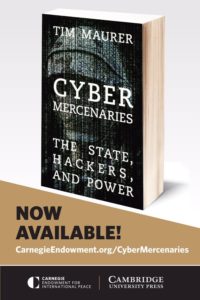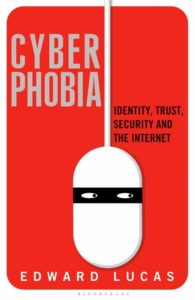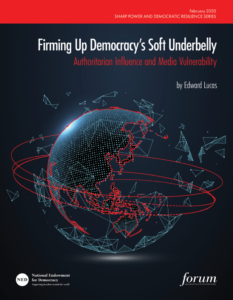 Growing cybersecurity threats are disrupting democracies and relationships around the world, the Truman National Security Project observes.*
Growing cybersecurity threats are disrupting democracies and relationships around the world, the Truman National Security Project observes.*
Democracies are particularly vulnerable to cyber attacks which can target institutions directly, or indirectly by undermining public trust in them. But democratic societies—because they cannot risk jeopardizing democratic values and principles—are constrained in how to prepare and respond to such attacks, according to Tim Maurer, co-director of the Carnegie Endowment’s Cyber Policy Initiative and author of Cyber Mercenaries – The State, Hackers, and Power, and Arthur Nelson, a research analyst at the Initiative.
It is therefore paramount to focus more broadly on institutions that depend on public trust. The following three are particularly worthy of increased attention, they contend:
- First, the census. Census data is a core pillar for the functioning of a state, from economic planning to how parliament gets elected in some countries. Similar to elections, if the collection, transmission, or storage of census data or processes were disrupted, corrupted, or even appeared to be corrupted, it could undermine trust in public institutions. As countries around the world rely more and more on digital services to conduct their census, mostly as a cost-saving exercise, the possibilities for malign actors to interfere with the conduct of a census grows…..
 Second, consider how reliant financial systems are on public trust. “The malicious use of Information and Communication Technologies (ICT) could . . . undermine security and confidence and endanger financial stability,” warned the G20 Finance Ministers and Central Bank Governors in 2017….Following past attacks that have been traced back to North Korean and Iranian actors, these are not empty warnings. Profit-driven nonstate actors are no longer the only ones targeting financial institutions—nation-states have gotten a taste for it too….
Second, consider how reliant financial systems are on public trust. “The malicious use of Information and Communication Technologies (ICT) could . . . undermine security and confidence and endanger financial stability,” warned the G20 Finance Ministers and Central Bank Governors in 2017….Following past attacks that have been traced back to North Korean and Iranian actors, these are not empty warnings. Profit-driven nonstate actors are no longer the only ones targeting financial institutions—nation-states have gotten a taste for it too….- Third and finally, elections have and should remain a top priority. The operation targeting the 2017 French presidential election demonstrated that the interference in the 2016 U.S. presidential election was not the end of it. It is also clear that the combination of hacking with the deliberate leaking of information is becoming the preferred modus operandi. Manipulating election infrastructure itself is more challenging—and keeping it secure must remain a focus—but it is easier to hack a campaign and leak compromising material to derail a candidate, and this requires a different set of responses and stakeholders.
“It is critical that election officials have the necessary personnel, tools, and infrastructure to repel attacks from increasingly sophisticated adversaries,” @SecureDemocracy’s @davidalanlevine writes. He provides 6 steps to secure elections.
 A new report, to be launched at the Munich Security Conference, explores how leading authoritarian regimes have exploited democratic norms and transformed the market for information into a dangerous tool to exert antidemocratic sharp power.
A new report, to be launched at the Munich Security Conference, explores how leading authoritarian regimes have exploited democratic norms and transformed the market for information into a dangerous tool to exert antidemocratic sharp power.
Under enormous economic and political pressures, independent media are struggling to respond, writes CEPA’s Edward Lucas, author of Cyberphobia: Identity, Trust, Security, and the Internet (above). News outlets face wrenching changes in their business models, driven by technological revolution. And features of the media system once seen only as strengths—such as competition, openness, and fair-mindedness—have also turned out to be weaknesses, according to Firming up Democracy’s Soft Underbelly: Authoritarian Influence and Media Vulnerability [PDF].
KEY IDEAS
- Unfettered or “faux-commercial” competition, openness to financial intimidation, fair-mindedness, and newsworthiness are features of the modern media ecosystem that can be exploited by malign actors.
- Russia disrupts and subverts the information systems of targeted countries through state media outlets and applying pressure through covert financing. China’s sharp power strategy involves, in part, buying up or collaborating with mainstream outlets while gaining influence over key content dissemination infrastructure.
- A blueprint for action on norm-building is overdue. Allowing commercial pressure alone to dictate information flows effectively sells political decision-making to the highest bidder.
- No single or simple solution will blunt the impact of sharp power on the information systems of democracies. An effective response to authoritarian media influence requires an array of normative, legal, and practical changes.

Hewlett
DOWNLOAD THE REPORT Firming up Democracy’s Soft Underbelly: Authoritarian Influence and Media Vulnerability [PDF]
The Hewlett Foundation has assessed its efforts to examine the threat of digital disinformation — one part of its broader Madison Initiative to strengthen the institutions of democracy in a polarized age. While grants have gone to independent research organizations that have advanced understanding of the challenge, independent, academic research related to social media has been hampered by a key hurdle: the fact that the data essential for understanding the problems are held by individual companies, who are wary of sharing their data with independent researchers, it reports.
Democracy in the Era of Disinformation
*The Truman National Security Project will convene a panel with expertise in information warfare, mass cognitive hacking, digital risk in political communication, information operations, and political warfare in Austin, TX, on March 15. Speakers: JENNIFER ATALA, Crosscomm, Inc.; JOSH BERTHUME, Swash Labs / Rogue Metrics; IGOR JABLOKOV, Pryon; CAMILLE STEWART, New America. RSVP







